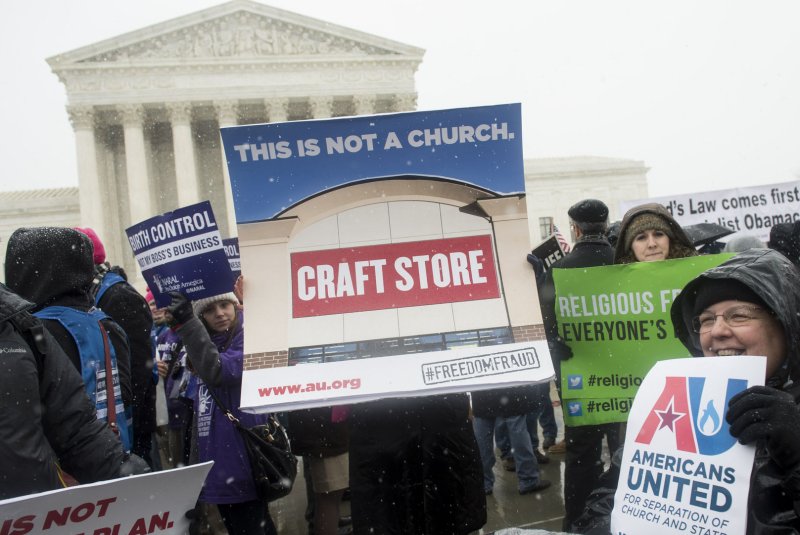Women's rights supporters participate in a rally in front of the Supreme Court as the Court considers two cases brought by Hobby Lobby and Conestoga Wood involving religious objections to the birth control mandate in the Affordable Care Act, in Washington, D.C. on March 25, 2014. UPI/Kevin Dietsch |
License Photo
WASHINGTON, June 30 (UPI) -- The Supreme Court Monday ruled that employers with religious objections can refuse to pay for insurance coverage for contraception.
Justices ruled 5-4 in Burwell v. Hobby Lobby, a major victory for the Christian-owned craft store and other companies who said their religious beliefs went against having to cover contraceptives for their employees.
The decision, written by Justice Samuel Alito, marks the first time the court has found for-profit companies can hold religious views under federal law. It specifies the decision only applies to closely held companies, in which 50 percent or more of the business is owned by five people or fewer.
Alito's majority was joined by the four other Republican-appointed justices, including Chief Justice John Roberts. Justice Anthony Kennedy wrote a concurring opinion.
Justices found the ACA's provision violated the 1993 Religious Freedom Restoration Act, which says laws that "substantially burden" the free exercise of religion must be justified to a "compelling governmental interest."
"RFRA's text shows that Congress designed the statute to provide very broad protection for religious liberty and did not intend to put merchants to such a choice," Alito wrote.
All four liberal members of the court dissented: Justice Ruth Bader Ginsburg wrote the dissent, joined by Justice Sonia Sotomayor and in part by Justices Stephen Breyer and Elena Kagan, who wrote a separate dissent.
Under the 2010 Affordable Care Act, all insurance coverage plans must include a range of free preventative care, including contraception. With the decision Monday, the administration will have to seek a new way to provide that coverage for women whose employers object.
Nearly 50 companies have sued under similar objections, although many have said they are willing to cover the cost of most contraception, just not drugs or devices that work after an egg has been fertilized, which they say constitutes an abortion.
Hobby Lobby, based in Oklahoma City, Okla., employs more than 15,000 people full time in 600 stores across 41 states. It is by far the largest employer to sue the administration over religious objections to contraception. Conestoga Wood Specialties Corp., of East Earl, Pa., is owned by Mennonites and employs 950 people.
The lawsuit is separate from those from religiously affiliated colleges, hospitals and charities.
Burwell v. Hobby Lobby















